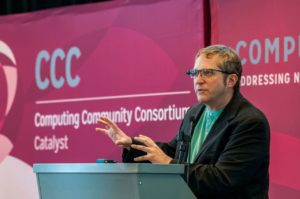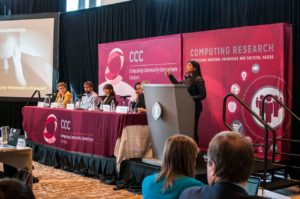
Thad Starner from Georgia Tech
While wearable computing might seem like a new thing, it has been a part of our imagination since 1945 when Vannevar Bush headed the U.S. Office of Scientific Research and Development and envisioned the head-mounted camera that a scientist could wear while doing experiments. This example and others were given by plenary speaker and Contextual Computing Group Professor Thad Starner from Georgia Tech at the Computing Community Consortium (CCC) Symposium on Computing Research: Addressing National Priorities and Societal Needs. Microdisplays, networking, and sensing all came together in 2010 and suddenly the field of wearable computing was no longer imaginary but real.
The CCC Symposium was held on October 23-24, 2017 in Washington, DC. We have been highlighting a different panel on the CCC Blog each week since the event. Check out this blog post for highlights from the Intelligent Infrastructure for our Cities and Communities panel and plenary.

AI and Amplifying Human Abilities Panel
The AI and Amplifying Human Abilities Panel looked at the emerging role of AI in augmenting human abilities in new and powerful ways. In particular, this session examined the spectrum of human and machine capabilities and how we develop systems that provide a seamless interface between the two.
- Brenna Argall from Northwestern University talked about assistive machines, such as power wheelchair switches, and how we need more sophisticated controls that maximize human abilities. Each assistive machine should learn how to naturally compliment user action without reducing overall performance or control.
- Jeffrey P. Bigham from Carnegie Mellon University discussed the power of deep integration of human and machine intelligence. He gave the example of the VizWiz dataset, which is an iPhone app that allows blind users to receive quick answers to questions about their surroundings. It combines automatic image processing, anonymous web workers, and members of the user’s social network in order to collect fast and accurate answers to their questions.
- Suchi Saria from Johns Hopkins University looked at how machines can amplify skilled humans to provide proactive care. She explained how home monitoring with a cell phone can be used to identify Parkinson’s disease. A cell phone can conduct a voice, dexterity, gait, and rest tremor test and possibly notice a change in a patient’s conduction much faster than a medical professional.
- Cliff Young from Google talked about Google’s data centers and how two different types of scale (data and compute) are enabling deep learning across many business domains. He also described the complementary roles of industry, academia, and government in the computing research relationship. Industry focuses on immediate development. Academia and government can and should look farther out because transformative ideas can’t be picked ahead of time and sometimes take decades to mature.
During the question and answer session with the audience, one audience member asked the panel about the possibility of using brain interface for control and understanding the intent of users for specific actions. Thad Starner discussed a set of ear buds that can identify brain signals. Brenna Argall remarked that all her conversations with clinicians state that brain-computer interaction is still 10-15 years out, but when most people think about brain-computer interface they are thinking about cortical implants, which go under the scalp muscles, so the signal to noise ratio is small and therefore their potential for future impact is much greater.
Members of the audience and panel discussed the need to machine intelligence that amplifies higher-level human cognitive abilities so that the two, human and machine, co-evolve together. The future best chemists, physicians, and designers will be innovative hybrids that push both computation and human abilities to new horizons.
Stay tuned to the blog next week as we continue to highlight the other session panels from the symposium. See the video from this plenary and panel session here.









